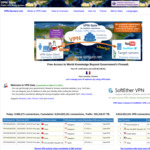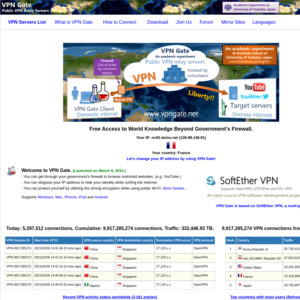"Free Access to World Knowledge Beyond Government's Firewall."
VPN Gate ia an academic experiment project at National University of Tsukuba, Japan.
I've known this free public service for a while and occasionally use it when I need Japanese ip address access to some Japanese sites where georestriction is in place. I constantly see VPN servers from Japan, USA and South Korea up and running. Good on them. Sadly don't see Oz servers that often :(
This site provides free VPN service from volunteer servers for free access to the counties where volunteer servers are set up. Available for Windows, Mac and, iPhone/iPad and Android.
You can simply use their public VPN service as a client or join to set up your VPN server and help people who need free access to online information without authority's restrictions and censorship.
Support information freedom and help people from where information is restricted by authorities.
The site says 'Visit our another VPN project, "SoftEther Project".
This is the parent project. VPN Gate is a child project of SoftEther Project.'
The SoftEther Project URL is
www.softether.org/


Do they have any app?